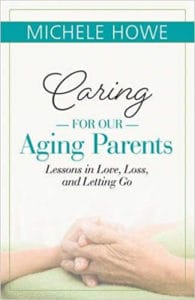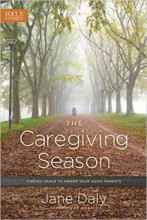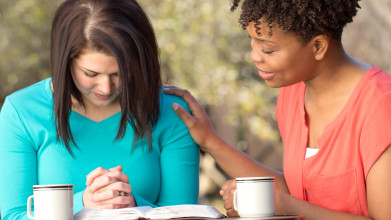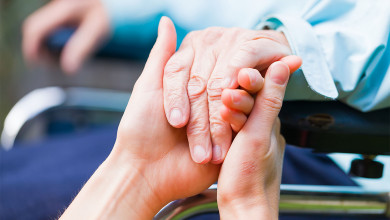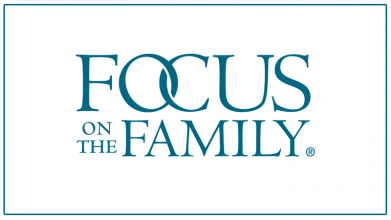Opening:
Teaser:
Woman #1: Hey, how’s that research going?
Woman #2: Not so good.
Woman #1: Well, there’s got to be some kind of support service out there that can help you with your mom.
Woman #2: Yeah, I’m sure there is, but where do I look?
End of Teaser
John Fuller: A growing number of people–especially women–are finding themselves with yet one more job to manage among many others already on their plate – and that is caring for an aging loved one. Taking care of an older parent or family member is a big job, but with the help of a loving community, you can get through it and find peace and fulfillment in that season of life, and our guest today will share about that. This is Focus on the Family and your host is Focus President Jim Daly, I’m John Fuller.
Jim Daly: We don’t like to think about getting older – in fact we fight it all the way – and we certainly don’t like thinking about death, which we all face at some point. But reality is, as people age, they often need to rely on care from other family members, and our guest today has experience in doing that.
Michelle Howe has cared for two of her relatives and has written a book called CARING FOR OUR AGING PARENTS. She contributed articles to Focus on the Family Magazine and many other publications.
And Lisa Anderson is our own Director of Young Adults ministry and the Boundless ministry for singles. She cared for her mother for two years before her mom passed away.
Let me say welcome Michele and Lisa to Focus on the Family.
Lisa Anderson: Great to be here.
Michele Howe: Nice to be here.
Body:
Jim: All right. Michele, let’s – let’s get right to it with the caregiving. Caregiving is a deeply personal journey for most people – certainly, for you and your story. You first had the opportunity to be a caregiver for a relative named Bill. That sounds kind of elusive. But was he an uncle, or what?
Michele: He’s actually my husband’s cousin.
Jim: OK.
Michele: But, he was an elderly cousin. So, he was the same age as my father-in-law.
Jim: OK.
Michele: Yeah.
Jim: So, it felt normal in that context
Michele: Right.
Jim: And he’s also your neighbor at the time, right?
Michele: Yeah, he – we live out in the country, and he was our only neighbor. We have farm fields all around us, so…
Jim: Oh, my.
Michele: Yeah, he kind of took over as our – our kids’ extra grandpa.
Jim: Yeah.
Michele: So, he was great.
Jim: Tell us about some of those circumstances, so the listeners can get a picture of what you were facing when Bill, your husband’s second cousin, fell ill and needed help. Was he alone?
Michele: Well, he was alone, and to give a little backstory, he had – he was an only child. He had never been married. He had, you know, no siblings, no kids. So, he was alone. And he was a hunter and a fisherman and just an avid outdoorsman – very independent guy.
Jim: And he was engaged with your kids, right? He was like a grandfather that lived nearby.
Michele: Mmm hmm, yeah. He lived next to – our kids would go over and watch TV with him, some cartoon in the evenings.
Jim: Right.
Michele: He’d come over for birthdays and be all dressed up – get his hair slicked back, nice white shirt. I mean, he was very, very attentive to our kids.
Jim: Yeah.
Michele: And did a lot of good things in their life and in our lives. He was wonderful. At 70 – he had never been sick – he started getting sick. He had cancer on his colon. He ended up with open-heart surgery, Parkinson’s, a second cancer, he had – he became diabetic, he had tons of urinary problems that were just embarrassing to this proudly independent man.
Jim: Well, let’s start there for a minute, because that’s so descriptive of our parents, or our loved ones, our family members that live a very – I mean, this guy sounds like a mountain man. I mean, he was very self-reliant, it sounds like. And that’s got to be the first blow to them, that their life is not going to be the same. In fact, I think you overheard the doctor talking with him, it made an impression on you. What happened?
Michele: Well, he was 70, when he first had his first bout with cancer. He got it removed, and then he went into a rehab for several weeks. And I was at a rehab meeting, which I didn’t know what was going to happen. It was a roundtable, like this, with a whole lot of medical professionals. Well, Bill – they wheeled him in, and he thought he was going home that day, ’cause he saw me.
Jim: Right.
Michele: Well, that was not what happened. The social worker said – looked at me and said, you live with her? Meaning me. And I said, no, he’s our neighbor. Well, for some reason, they had that all mixed up, and I don’t know how they got that mixed up.
Jim: Right.
Michele: But then they all started looking at each other, and then the furtive glances. And I could tell it was going south fast.
Jim: Yeah.
Michele: And then he knew he wasn’t coming home that day.
Jim: And that was because he physically wasn’t able to be alone.
Michele: Correct.
Jim: Right.
Michele: I mean, he was still real unsteady. It would not have been safe for him. Even us being next door and going in, you know, attentively watching him, he could fall in the night; it would have been a good thing. But I remember big tears rolling down his face. I’m choking back tears, wishing my husband was there, but he couldn’t, because he was at school teaching. And that hit me so hard. I thought, He placed such a responsibility on our shoulders to take care of him, and I felt like I had stabbed him in the back.
Jim: Right.
Michele: Because I couldn’t safely say to them, “Oh, yeah, bring him home. He’ll be OK.” I knew he wouldn’t be OK yet.
Jim: Right.
Michele: And that was just one of the first emotions we started really going through.
Jim: Right.
Michele: And you think of – that weight of that responsibility – another person, and their heart’s breaking right in front of you, but it’s not the best thing. And it’s just like being a parent – you say, “No.” You – and it just didn’t work.
Jim: Yeah.
Michele: So…
Jim: You know, I’m sure the listener – I know the story. But, some listeners are thinking, Well, why didn’t you have him come and live with you? At that moment, why didn’t you just make that decision? What were the circumstances that, uh…
Michele: Well, we still had four teens living at home, no extra bedrooms.
Jim: Well, that’s the point.
Michele: And our house is not that big, anyway.
Jim: Right.
Michele: But you know what? I don’t think he would have wanted to live with us. I don’t know if I – he was a big guy.
Jim: Right.
Michele: I couldn’t have handled him on my own.
Jim: Right. Well, but – and that’s indicative of the kind of decision-making that you’re faced with, all of a sudden. I mean, unfortunately, for you it was in this awkward meeting.
Michele: Yeah.
Jim: But obviously, the hospital staff assumed that he was going home with you.
Michele: Right, right. And then, you know, after we’d all talked – they were very encouraging – and I think he came home a few weeks later, when he was ready.
Jim: Yeah.
Michele: And then we were able to offer, you know, the respite care, by being there every day for him, and he was fine. But at that meeting, he wasn’t ready.
Jim: Well, and again, that was the first speed bump for the decisions that are going to follow.
Michele: Sure.
Jim: And we’re going to come back to that part of the story and learn more from you. Lisa, let me get you into the discussion here. You cared for your mother for two years in your home. Describe your situation and her situation. What was the environment about?
Lisa: Yeah. And it’s weird, because I was actually thinking this morning how, actually, my dad had died 10 years prior, and I was like, oh, my goodness, I was a little bit of a caregiver for him, too, in the sense that he got cancer quite quickly. I remember taking a leave of absence from work to go and help care for him, and he ended up passing away later that year, and that was just so shocking to me – the first close person that had ever died. And then fast forward, mom started developing dementia. She got to the point where she could no longer be in her home. And she actually made the decision to go into assisted living, and we were all grateful for that. So she did, but immediately hated it. And so, we had three years of her – you know, I would call her most days and her saying, you know, “When are you going to get me out of here?” Or, “Why do I have to stay here? Why am I here with all these old people?” While the dementia was progressively getting worse. And so, I – I knew that I wanted her to have a great last season. I knew that, if I possibly could, I would move her out here to Colorado to be with me. And I started talking about that. I was in a Bible study. I started sharing that as a prayer request. But I’m single. I work full time. I’m, like, “I can’t care for my mom, you know, she needs full-time care.”
And a friend of mine in Bible study stepped forward and said, “If there’s any way I can be of help, I would love to do that.” And I think, even at that moment – I mean, that to me was God saying, pull the trigger on this. We’re gonna make it happen. You’re gonna get the support you need. And um – and so I – I knew that I wanted to pursue it. But, I think even then, I had a rose-colored glasses view of, like, Oh, this is gonna be amazing. mom and I are going to have this girl time. We’re gonna just, like, you know, reclaim all these lost years. It’s gonna be fabulous. I’m gonna get her on routines, eating healthily, doing – we’re gonna go do activities (laughter). And I just thought it was gonna be all rainbows and unicorns. And…
Jim: You had some of that, I’m sure.
Lisa: We had – we had great, great times. I mean, I look back on it, and I’m, like, so grateful. I had mom full-time for over two years. And I mean, I started writing things down – hilarious things she said, great experiences we had. And so, I remember having that time with my dad. And I’m like, I want that with my mom, too. And so – so it was great. There were great times…
Jim: Yeah.
Lisa: Super hard times, too.
Jim: Let me ask you this – you know, again, listeners are gonna be living different phases of what we’re talking about. And for their benefit, you have you have siblings, and that entered into the discussion. How did that play out? And I would imagine expectations are the biggest issue.
Lisa: Yeah.
Jim: Like, each of you had expectations of what the other would do.
Lisa: Yeah.
Jim: Or who would participate, how much work would be done by each of – you know, divide the work evenly (laughter).
Lisa: Yeah.
Jim: Who knows what you were thinking. But that tends to be one of the big issues, right?
Lisa: Yeah. Well, I mean, let me just tell you, Jim, that here was my expectation (laughter) – I was saying, going into this with my mom, especially, saying, “OK, I’m doing – let’s be honest here, this is kind of a heroic act.”
Jim: (Laughter).
Lisa: “I’m going to take her in full time. You know, I’m getting her out of this horrible assisted living,” which was totally this Christian-owned, awesome place (laughter). Amazing situation, but just not – she was – she was kind of dying on the vine. So, I thought, OK, I’m gonna bring her in. Financially, this is a good decision. This is – she’s gonna be with family. She’s gonna live out her last season. This is gonna be great. My siblings, surely, are gonna say, “OK, how can we help? What can we do? How much money do you need? What kind of respect do you need?” Well, we didn’t have any of that conversation on the front end, so I made all these assumptions that ended up being a huge discussion on the back end because some of them are out of state. You know, they – many of them have kids and now even grandkids. And so I just thought, “Let’s all – you know, hey, guys – let’s all drop everything and do what we can for mom.” And they’re like, “Uh, FYI – we have other things going on in our lives, too.”
Jim: Well, and being single, that made sense to you.
Lisa: Right.
Jim: This fits me.
Lisa: And let’s be honest, there was a little bit of this, “Um, Lisa, you’re single. Don’t you just have the time and the means to do this?” And I’m like, “Dude, I’ve got a life. Like, I’ve got a lot of stuff going on. This isn’t just about, like, single people don’t have anything else going on.” So – so there was a lot of – I would say there was – there was some bitterness. There was a lot of conversation that had to happen, and it happened throughout the last two years of mom’s life. And even afterwards, you know, we’ve had to work some stuff out. So, I mean, I’m a big proponent of – start having these conversations on the front end, when everyone – especially if you have a parent, you know, struggling with dementia, or another family member – you know, when they can be part of the conversation, so you can get that ball rolling right away.
Jim: And that is good practical advice. What are some of the questions, rolling the tape back, would you have asked earlier in the process that would have made it better?
Lisa: Yeah, like what – what is – you know, mom, what is your ideal situation? Where would you like to be? What – you know, what kind of family would you like around you? Are you OK being – you know, moving into an independent living situation then possibly an assisted living situation? Where are we all financially, including the person who needs care, as well as the family members? What are you willing and able to contribute to this process? How close in proximity is everyone willing to be? How many hours per week or a day – you know, what does it look like? What – what’s the time and the resources that you can give up at this stage? Just a lot of questions that I think were very assumed. And we hadn’t gotten on the same page.
Jim: Yeah. Michele, let me ask you – and, Lisa, jump in. But, one of the things that you’re expressing here – and this is one of the more difficult aspects of caring for elderly parents or relatives – is the culture is kind of seeped into the church, as well. You – we get an idea that, centuries ago, this was all done, and Christians just simply did the right thing, because it was God honoring to – honor your parents in this way. But we get, you know, the influence of the culture with comfort and leisure, and there’s ways that we can put mom and dad in a place, and they’re taken care of, and our conscience is eased, and we’re not troubled. It’s just a financial burden. Speak to that dichotomy. My heart tells me that in some cases, that’s exactly what some parents, or grandparents are going to need, is that kind of special care 24/7. They need to be in a facility where they can be taken care of. Then there’s the choice of doing it for my comfort and ease, as the caregiver. It’d be far better to put them in the – the assisted living. How does a person manage that guilt and how to make the right decision for their aged loved one and – and be comfortable with it? Does that make sense?
Michele: Yeah, that makes sense. And I think – I’m just listening to Lisa talk, and I’m thinking of how many friends have gone through exactly what you went through. You know, they didn’t have all those important conversations ahead of time, on every level, you know. And then there’s all that heartache, bitterness creeps in – all that kind of stuff. But yeah, you’re right, I think the culture has changed the way we look at, well, retirement, too…
Jim: Right.
Michele: …older people, in general. And you know, someone with dementia eventually needs to be in a home, because I don’t believe anybody can take care of them properly, without burning out. I mean, if you have a husband and a wife, and the husband’s taking care of the wife, and she escapes in the middle of the night, that’s not good for anybody, you know, and those – that happens way too often. And I know it’s heartbreaking. So, there’s those special since – situations where, I mean, I think assisted care is great, you know, and it’s needed. But then, if you have people – which there’s probably too many – who are well-to-do families and are just too busy to take care of their elderly, then you have to ask those questions. But it is a case-by-case…
Jim: Yeah.
Michele: …Study.
Jim: And I don’t want to place a guilt trip on people, because you know, it is case-by-case. You’ve got to know very specifically what’s going on. And it’s hard for us sitting in these chairs to throw out a blanket recommendation. All that I hear you saying is, consider your case.
Michele: Right.
Lisa: Yeah.
Jim: You know, what’s the best thing for your loved one?
Michele: And you have to evaluate the relationship you have with your loved one, too. If you have a contentious relationship with your mom or dad, you may not want them to live with you; they may not want to live with you.
Jim: Yeah.
Michele: I’ve had people that I’ve interviewed talked to me and say, it would never have worked, and they didn’t want to come.
Jim: Yeah.
Michele: So, I – I did it as much as I could, as much as they would allow.
John: I so appreciate that Michele. And we’re talking today on Focus on the Family with Michele Howe and Lisa Anderson about caregiving for aging loved ones, and we’re going to suggest that you get Michele’s book to help you navigate caregiving, or to be prepared when the time comes. It’s called CARING FOR OUR AGING PARENTS. And we have that and a CD or download of the 2-day conversation at focusonthefamily.com/broadcast.
Jim: You know, one of the most heartbreaking things that I recall – Jean and I would take the boys, when they were younger, to assisted living facilities at Christmas to hand out blankets, or gift bags and things like that. There are some scary funny moments, you know, that you don’t anticipate putting your little children in that place. I remember one was Troy (laughter) – Troy walked in to deliver a bag, and the woman started screaming at him, saying, “You’re trying to steal my purse.”
(LAUGHTER)
Jim: And Troy was – his eyes got really big, and he started to cry, and he ran out of the room (laughter). But there’s also the heartbreaking one, was where we walked into a room, and this woman who had her makeup on, her hair looked nice, she was finely dressed, and she was sitting on the edge of the bed, very alert mentally. And we walked in, and – and as she unfolded her story for us, very eloquently, she just said, “You know, I came here two years ago. I don’t see my family. They don’t come to visit me anymore.” And she was very alert. To me, it was almost like – I didn’t know the whole story – but that she could have lived on her own. She was that capable. But, think of that, where you’re abandoned. You’re put in these places, and your family just never comes, because it’s that chaotic, or whatever excuse they might give. Speak to that situation where that decision may have been made, where you’re going to place grandma in that assisted living situation. But, what should you do to show her love, as she continues through her last phase?
Michele: Well, one thing is – you show up. And I remember my husband – this happened early on with Bill. And he made it a point of, “We’re gonna go see him every day in that nursing home, while he’s recuperating.” Because he – we knew he didn’t have any other family. And he had a lot of friends, but who knew which friend was gonna show up on what date? So, my husband made it his mission. And in fact, sometimes he and I would get a little – ehhh – because I would think, I can’t go up today, because I have this and this and this and this, which is a whole ‘nother topic. Sometimes you want to do the right thing. And like you said, you’re exhausted. You work all day, plus everything else it takes to make your life function. And then, you come into a situation where someone needs you. And this is when I – what we learned the second time around – have the conversations upfront, with everybody who cares about the person who’s sick and say, “OK, this is what needs done. Let’s all pick a day.”
Jim: Yeah.
Michele: Or, “Let’s pick a task and really divide it up so that everybody isn’t, you know – you’re not all getting burned out. It’s reasonable.”
Jim: Yes, that’s good.
Lisa: I think another thing that’s important to remember is there are a lot of folks who move into some kind of senior living situation that ends up being amazing.
Jim: Right. They love it.
Lisa: And they end up thriving there.
Michele: Yeah.
Jim: Yeah.
Lisa: So, like, for example, you know, people that are housebound, or end up being really lonely, or whatever, they get in. All of a sudden, there are activities. There’s structure. There are new friends to make. And they thrive, but not everyone does, and that’s kind of – you know, I was so disappointed, you know, because I thought mom was going to have this wonderful experience, and she just wanted to sit in her apartment and read. And so, that’s kind of when I knew, like, this is not a good situation for her. And so, what can we do differently? And that’s why I think, even for the folks that – I mean, the – the situation of the woman sitting on her bed; it just breaks my heart, because she probably could have gone out with people – the person who could take her out for lunch, or the person who could come and visit her.
Jim: Absolutely.
Lisa: Or do stuff with her. I mean, clearly, she wanted to engage.
And that’s why I think – you know, Jim, for me personally, I just remember when I finally had to start thinking about this 1 Timothy 5 came to mind. And I was so personally convicted by it when it said, you know, Widows with children and grandchildren (laughter) – it is their responsibility to care for their own. And it’s not – you know, and I thought to myself, oh, my word. It’s not not the responsibility of the state. It’s not the responsibility, even of my church. Now, their responsibility is to support me in what I’m doing, but this is on me and, you know, collectively, my siblings and whatever. And so, I just thought to myself, “There’s no way to get around that and to realize that this is my mom, and this is my – and in honoring her, I am honoring the Lord. And what – however that plays out and whatever this ends up looking like, this is my deal, and I need to wrestle with this, and I need to figure out how to make this happen, because I can work X number of hours the rest of my life, I can have my friendships, I can do my stuff and serve, but my first line of service is to my own family, to my own mother. And it will be a privilege, and it will be a joy, and I will have no regrets.”
Jim: Hey, Michele, I want to come back. You mentioned your husband James. What kind of special stresses occur in the marriage, when you’re caring for a loved one? I mean, and you alluded to it, but I want more specificity. That can really become a problem within the marriage, right?
Michele: Yeah, it can. You know, I was thinking this morning, when I’m looking back – ’cause this has been about 13 to 15 years ago when we took care of Bill. And I remember that time – it was a five-year period – waking up every day and wondering if that phone was going to ring or how many times it was going to ring, where I would have to stop doing what I was doing with our kids – because I was home-schooling the younger two, still, at that time.
Jim: Right. I mean, you had your hands full.
Michele: Yeah, we did have our hands full. And then, I would try to fulfill whatever he needed. But then, you know, I would – there was a new need or – and then he’d go back into the hospital, and then we would start the whole rigmarole again – many doctor’s appointments. It just – it was just overwhelming to me. So – it was almost like Jim kind of picked up that mantle for our whole family and said, “Our kids are going to learn to do this early on,” which is all great. However, these ideals of doing it, and the rubber hits the road, when you’re already exhausted and you’re tired – and you have to hammer out what’s reasonable.
Jim: Yeah.
Michele: And I think – we did argue at times. And then I would feel guilty, because I knew it was the right thing, but then I thought, I can’t do it. I can’t do it. I have 10 other things I have to do. And I’d be torn all the time.
Jim: Well, what does a person do in that space? We’re talking to people right now that are living where you were.
Michele: Yeah.
Jim: What’s a practical thing when you feel it’s the right thing, but I have no margin? What do you do?
Michele: Well, you know, early on, we should have brought more people into the mix. We didn’t realize – we were so naive and green about caregiving, we didn’t know that there were people who would actually come over to Bill’s house and clean it. Or the Meals on Wheels – kind of heard of meals, but we didn’t – we weren’t really getting all that. We were…
Jim: So, you wanted to do it all or just didn’t have time to investigate.
Michele: Yeah, we were doing – we were doing all of it.
Jim: Yeah.
Michele: You know, and we’re both Type A people, and we’ll get in there, and we’ll do it until we die, you know. And I think, after the fact, I don’t believe, from my perspective, that we ironed everything out while Bill was still alive. It took, for me, anyway – I don’t know how my husband feels – sometime after he had passed away to kind of just be contemplative about it and think about what did we do right, what did we do wrong? And that’s OK. Because in a few years later, my father-in-law, he had esophageal cancer. And he only lived five months, and we were thrust into helping him again. But we did it so much better the second time around.
Jim: Yeah.
Michele: Because we’d had more experience.
Jim: And we’re gonna pick that up next time. I want to continue the discussion, and we’ll talk about that. I did want to mention a quote that you had in your book. I think the quotes from Roy Hession. It said, “People imagine that dying to self makes one miserable. But it is just the opposite. It is the refusal to die to self that makes one miserable.” I mean, what a place to end. But I want both of your perspectives regarding that, because it’s counterintuitive – all the work, all the giving I have to do is gonna take from me. The fact that you can anticipate that it will be more rewarding is lost at the front end of that effort. So how do you respond to that?
Michele: All I know is, when I look back at the two experiences we’ve had, the first one, I think, we didn’t know what we were doing, but we did our best, you know. And the second time around, God really brought to mind a lot of correctives and kept teaching us, “Do it a little different this time. Enlist a lot more people.” And you know what? We had more wisdom. We had more understanding. We had the same heart both times. We love both of those men so much. (EMOTION) But we didn’t know, you know. And I think so many people are facing – like you just said, they know – caregiving starts out, maybe you think you’re gonna have to do a few things, and it can become 24/7 very fast.
Jim: Yeah.
Michele: And people lose it, you know. They will just lose it.
Jim: They’re not equipped.
Michele: They’re not equipped; that’s the right way to say it. Yeah.
Jim: Yeah. I mean, and it can overwhelm you like a tsunami. You’re just swept away with all the activity.
Michele: Right.
Jim: And I see that. Are those tears coming from a place of guilt? Or – explain that passion that you’re expressing.
Michele: Well, I guess – not guilt so much as – because I dealt with the guilt; it’s been enough years now. But I think there’s so many people who aren’t equipped, and we have to help equip people.
Jim: Right.
Michele: Like, Jim, you know what you’re doing now. You could be such a great person, Lisa, for all your friends. And all my friends who were a little farther along, boy, they gave me advice and they helped me. And one friend laughingly said, you know, “You’re looking for logic here, honey. There are no logic.”
Jim: (Laughter) Right.
Michele: “The logic is out the door.”
Jim: Right.
Michele: “You have to think in a different way.” But I just think people, like, in many areas their life, are ill-equipped. And yet, we have our church family.
Jim: Yeah.
Michele: We have the Lord. We have the Holy Spirit to help us. But sometimes we operate out of guilt, out of wrong motives, and that doesn’t help anybody.
Jim: Well, and this mission that we’re given by the Lord, to take care of elderly family members, it’s packed with emotion. Lisa – perspective?
Lisa: Yeah. I mean, I think, too – I just think of parents who go into parenting, you know. No parent that I’ve ever known says, “You know, the one thing I look forward to in parenting is just absolutely losing it and going crazy on my kid.”
Jim: (Laughter).
Michele: Yeah.
Lisa: And you do that with caregiving, too. You think that you’re gonna be this sweet person who’s just going to always have a great word and helpful thing for this person, and it is just super hard and taxing. And I – but I just realize how, even looking back on my season, like, I spiritually grew exponentially, like, in ways probably that I didn’t want to, and I didn’t want to walk through that. But, I just grew. I my – my heart of compassion for the elderly, for other caregivers, for people that have struggled with health issues for people with financial issues, who are just, like, looking forward to their – their final years and just saying, “What am I gonna do?” The fear there to step in and be able to offer a word of encouragement, or help in that space – it’s just huge. And honestly, you know, my perspective as a, you know, comparatively younger caregiver – I mean, there aren’t many people in their 40s who’ve lost both parents now and grieving that and grieving the role reversal and all the things that came with that, while at the same time realizing, OK, there’s a responsibility here. But looking back on it and just realizing, no one can ever take that space from me and those memories from me. And the feeling that I was part of that – and you know, (EMOTION) I just say, and I always get choked up, when I say this, “I had the privilege of walking mom home.” And not everyone can say that, you know, that they had the privilege of walking a parent into heaven and to – you know, that I’m gonna see her again someday, and that’s totally cool. And I’ll see dad. And – and just to be able to introduce mom in her right mind to the friends who stepped in with me and were able to help me on that journey. And it’s just gonna be really cool. I’m looking forward to it.
Jim: Wow. I mean, you have packed the very – and you’re both crying; we’re all three crying now.
(LAUGHTER)
So, Lisa, way to go. But it is such a good thing to contemplate. And if you are living in this place right now and you need somebody to talk to, we’re here. We have caring Christian counselors at Focus that can actually help guide you through the thought process on what to do and what are some next steps. Certainly, Michele’s book is a great place to start, and we want to make that available to you, as well. In fact, if you can support the ministry for any amount, we’ll send Michele’s book, as our way of saying, “Thank you.” It’s terrible to end on that kind of emotion, but let’s come back. Next time we’ll pick up there and continue the discussion. Can we do that?
Michele: Yes.
Lisa: Absolutely.
Closing:
John: Get in touch with us and ask for that book, or to schedule a consultation with our counselors, when you call 800 the letter A and the word FAMILY. That’s 800-232-6459, or visit focusonthefamily.com/broadcast, we’ll also have the CD or free download of this 2-day program, including tomorrow’s discussion.
On behalf of Jim Daly and the rest of the team here at Focus on the Family, thanks for listening, plan to join us again next time for more of this conversation, as we help you and your family… thrive in Christ.












